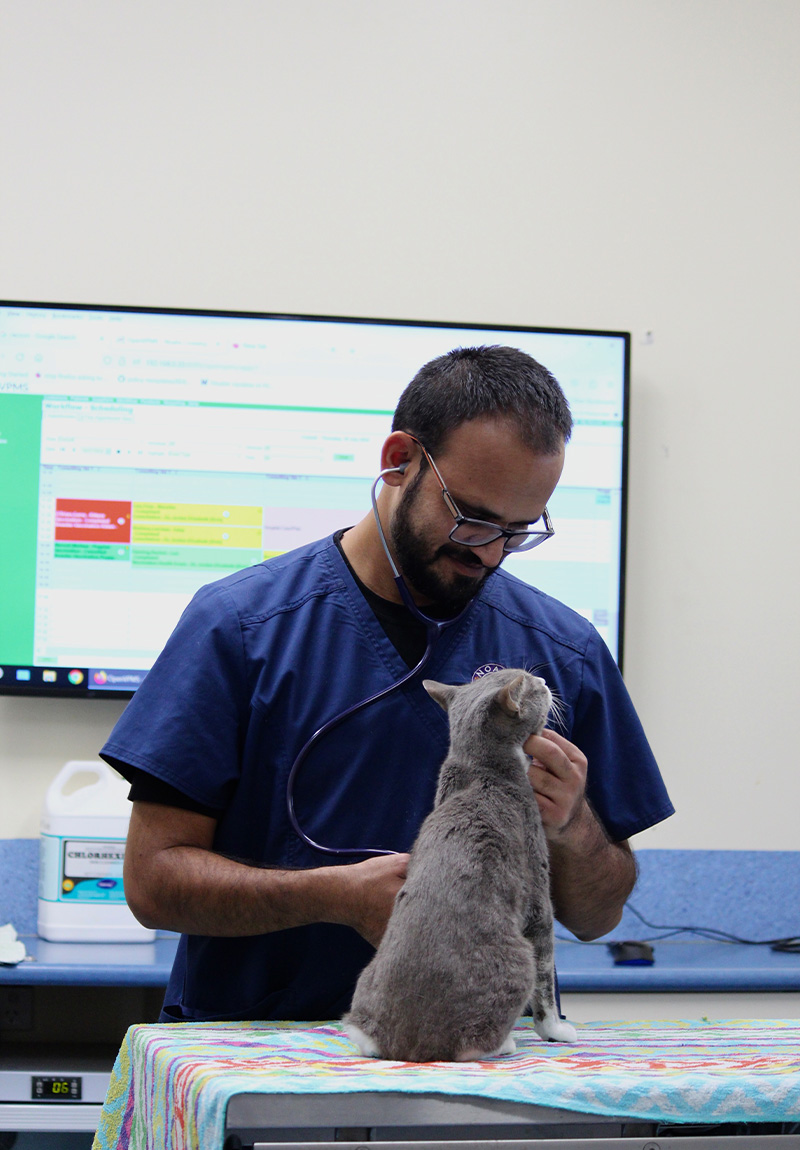Parasite Control
Parasite Control
At Noah’s Crossing Vet Clinic, we recognise that protecting your pet from parasites is a critical aspect of their overall health and well-being. Parasitic infections, such as intestinal worms, heartworms, and fleas, can have serious consequences for your pet’s health, leading to discomfort, illness, and even death if left untreated. Our comprehensive parasite control programs are designed to keep your pet safe and provide you with peace of mind.
Intestinal Worms
Intestinal worms are one of the most common and significant health concerns for puppies and kittens, but all pets, regardless of age, can be affected. These parasitic worms live within the intestines of affected animals and can range from microscopic to several centimetres long. Despite their size, intestinal worms can cause severe health issues, including malnutrition, vomiting, diarrhoea, and in some cases, anaemia or death.
Common intestinal worms that affect pets in Australia include:
- Roundworm
- Tapeworm
- Whipworm
- Hookworm
Pets can become infected with intestinal worms through a variety of means, including direct contact with contaminated environments, ingestion of contaminated food or water, or from fleas that carry tapeworm larvae. Worms may also be transmitted through the mother to her offspring, making early worming treatment essential for puppies and kittens.
If left untreated, heavy worm infestations can result in significant weight loss, poor coat condition, and general lethargy. In severe cases, parasites can damage vital organs and cause life-threatening complications.
Key Points for Intestinal Worm Control:
- Puppies and Kittens: Initial worming should begin at 2 weeks of age, with treatments repeated every 2 weeks until 12 weeks old.
- Adult Pets: Regular worming is required every 3 months for adult dogs and cats.
- Environmental Hygiene: Keeping your pet’s environment clean, promptly disposing of faeces, and practising good hygiene can help reduce the risk of reinfection.
- Human Health: Certain intestinal worms, such as roundworms and hookworms, can also pose a risk to humans, particularly children. Proper hygiene and routine deworming are essential for protecting both pets and family members.
There are various treatment options available for intestinal worms, including tablets, spot-ons, and pastes. Our veterinary team will provide tailored advice based on your pet’s specific needs and lifestyle.
Heartworm
Heartworm disease is caused by the parasitic worm Dirofilaria immitis and is transmitted through the bite of an infected mosquito. Unlike intestinal worms, heartworms live in the heart and pulmonary arteries of infected pets, where they can cause severe damage to the heart, lungs, and other organs.
Heartworm is a serious, but preventable, condition. It is prevalent in most parts of Australia, with the exception of Tasmania and certain arid regions. Both dogs and cats are at risk, although cats are generally less affected and may not exhibit clear symptoms. In dogs, heartworm disease can lead to a range of symptoms, including coughing, lethargy, exercise intolerance, and in advanced cases, heart failure and death.
The Heartworm Life Cycle:
- Infected dogs have microfilariae (immature heartworms) circulating in their bloodstream.
- When a mosquito feeds on an infected dog, it picks up the microfilariae.
- The microfilariae mature into infective larvae inside the mosquito.
- A mosquito bite then transmits the infective larvae to another dog or cat.
Prevention is Key:
Heartworm disease can be easily prevented with regular treatments, which include oral tablets, chews, spot-on treatments, or an annual heartworm injection. At Noah’s Crossing Vet Clinic, we recommend testing for heartworm infection before starting a prevention program, especially if your pet has not been on regular heartworm prevention. A repeat test 6-12 months after starting a prevention regimen is also advised to ensure effective protection.
Flea Control
Fleas are a common and persistent problem, particularly in warmer months, though they can be found year-round in homes with central heating. Fleas not only cause discomfort to pets, but they can also transmit other parasites, such as tapeworms. Additionally, fleas are responsible for a skin condition known as Flea Allergy Dermatitis (FAD), which is an allergic reaction to flea saliva. Pets suffering from FAD may experience intense itching, hair loss, and secondary infections.
Flea Life Cycle:
Fleas spend the majority of their lifecycle off the pet, living in bedding, carpets, and other areas of the home. Flea eggs and larvae can survive in the environment for months, so it is essential to treat both your pet and the environment to break the flea cycle effectively.
Signs of Flea Infestation in Pets:
- Dogs: Scratching, biting, and hair loss, particularly around the base of the tail, rump, and groin area. Flea dirt (faeces) may be present on the skin.
- Cats: Excessive grooming, especially in front of their owners, is a common sign. Flea dirt can also be found around the neck, chin, and underbelly.
Preventative Measures:
We offer a range of highly effective, monthly flea treatments for dogs and cats that not only kill adult fleas but also help control environmental infestations. It is also crucial to regularly wash bedding in hot water and vacuum carpets and furniture to eliminate eggs and larvae.
Important Note on Flea Treatments:
Some flea treatments available at non-veterinary outlets can be harmful to pets, especially when used on cats. Always consult with us before using any flea products to ensure they are safe and effective for your pet.
Comprehensive Parasite Control Strategy
To effectively protect your pet from parasitic infections, it’s important to adopt a holistic approach to parasite control. At Noah’s Crossing Vet Clinic, we offer personalised parasite prevention programs based on your pet’s age, lifestyle, and environment. By using a combination of deworming treatments, flea control products, and heartworm prevention, we can ensure your pet remains healthy and parasite-free.
Routine Parasite Prevention Checklist:
- Worming: Regular deworming according to your pet’s age and lifestyle.
- Heartworm: Monthly prevention or annual injections for dogs; regular testing and preventive treatment for cats.
- Flea Control: Ongoing flea prevention for both pets and the environment.
- Environmental Hygiene: Regularly clean your pet’s bedding, toys, and living areas, and dispose of pet waste promptly.
By partnering with us to manage your pet’s parasite control, you are investing in their long-term health and preventing costly and potentially serious health issues.
Contact Us:
For expert advice and to discuss the best parasite prevention plan for your pet, please contact us at Noah’s Crossing Vet Clinic. Our team of experienced veterinarians and nurses are here to provide comprehensive care and support for your pets’ health needs.

